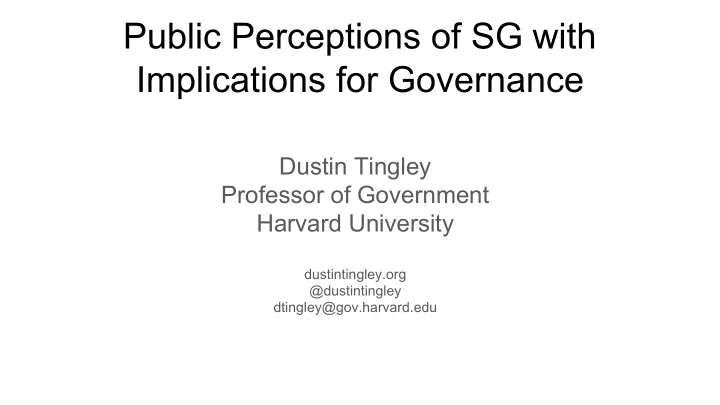

Public Perceptions of SG with Implications for Governance Dustin Tingley Professor of Government Harvard University dustintingley.org @dustintingley dtingley@gov.harvard.edu
SG Public Perceptions and Governance: What are the questions? Prior knowledge of SG? Conditional on knowledge about SG, what do people think about [support for research, deployment, intellectual property, governance configurations, … ]? When and how do public perceptions matter for the establishment and maintenance of governance? How to separate “public perceptions”, various advocacy groups, and governance in practice.
Low Familiarity Basic mechanism of SG is familiar/accessible (sunlight reflection). SG deployment techniques/proposals are not. US sample: 2016, ~20% somewhat or very familiar, 2018, ~30% But among those saying very familiar, when asked what is it for, most got the “right” answer, but not everyone. 1 Improving the performance of solar power production. 2 Reducing climate changes around the world. 3 Reducing the environmental impact of mining. 4 Reducing the chance of getting a sunburn.
General support for research; use? Research In 2018, among those understanding what SRM is, over 80% support research. Even among those who were more confused on SG, 70% supported research. Intellectual property concerns/implications have surfaced but not well studied. Use Hard to gauge support for use...use conditional on what (need, effectiveness, cost, where deployed, how/what deployed, who deployed, etc…)? Sans framing, “tepid positive” in the US. Lots of variation.
Chemtrails and SG Vast majority of conversation on Twitter about SG is linked to “Chemtrails”. Chemtrails are a bipartisan conspiracy. People engaging on chemtrails also engage in other “communities of conspiracy” (Tingley and Wagner, 2017) Governance and conspiracy are like light and reflective materials.
Implications for governance SG will be susceptible to elite framing (pro and con). Even if SG is not very a partisan issue, it could become one. -Sound familiar? -I’m optimistic re non-partisan (who has incentive to ‘own’ the issue). Misinformation will be hard to combat (already connected to climate politics, lots of various technology components, uncertainty/deep uncertainty, connections to other conspiratorial communities, etc.). Even hyper small field experiments will draw criticism from vocal citizens even great process components; unclear if broader populace will care...
Governance technology Don’t just think about governance being about collections of people deliberating/deciding/being transparent, etc.. Governance is connected to technology platforms that society uses to consider policy making. Are you satisfied with the Federal Register or Twitter? “Public E-Participation in Policymaking via a Visual Reasoning Platform” (Bose, Ojo, Tingley) “Debating Solar Geoengineering on the Kialo Visual Reasoning Platform” (Bose, Ojo, Tingley, 2018, https://goo.gl/fSi885) Kialo.com Example SR debates on Kialo https://goo.gl/CQUpnh https://goo.gl/JHi5Ew
Public Perceptions of Governance Some signs of partisan differences: Democrats prefer multilateral SG governance, Republicans take a more unilateral/small set of countries approach. This parallels other issue areas as well (e.g., foreign aid). Lesson: in thinking about SG governance, don’t ignore the politics of other issue areas. Similar background considerations.
Moving past “Yes/No” “Publics want to discuss geoengineering not as a yes/no verdict on a particular technology, but in the context of a broad array of climate futures” (Holly Buck) Poli sci speak, “issue linkage”. Implications for governance, a tension: Governance over SG linked with other climate approaches might be more appealing to the public, and appropriate, but proliferates the dimensionality of the governance problem making it hard to govern. “Polycentric governance” (Nicholson et al.) faces similar challenges.
Role of Bottom Up SG? Harrison (2018) Decentralized efforts to increase localized reflectivity in urban environments to address “urban heat”. Very pragmatic, easy for other SG technologies to issue link up with, anecdotally palatable ( interesting to think about why ). Even if impacts are small, governance implications could be more substantial.
Recommend
More recommend